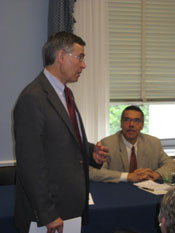Fogarty’s Michael Johnson goes to Hill to promote research
May - June, 2009 | Volume 8, Issue 3
Fogarty Deputy Director Dr. Michael Johnson says only academic research has the capacity to produce knowledge over time and, thus, universities are the best places for private and public investments in science.

Fogarty Deputy Director Dr. Michael
Johnson told a congressional briefing
that investments in universities now
will pay off for the U.S. economy in
10 or 20 years. Pictured is
Rep. Rush Holt, D-N.J.
At a recent congressional briefing on the economic impact of global health research, Johnson said the Institute of Medicine's call for more funding (see article on the Institute of Medicine's report) and President Obama's budget proposal (see article on Obama's pledge for global health funding) should provide a bigger pot of research dollars.
He noted that unlike international consulting firms whose global health work ebbs and flows with the availability of money, "University X and University Y will still be there when the funding shifts."
Rep. Rush Holt, D-N.J., co-chair of the congressional research and development caucus, said the American Recovery and Reinvestment Act and the budget indicate "a new attitude toward research" but "we still have a lot of work to do on the Hill to make sure that research is not just a sideshow or an afterthought but is central to the work in every area we deal with."
Johnson was part of a panel at the briefing sponsored by the health advocacy groups Research!America and PATH that linked global health research with economic development.
Dr. Jo Ivey Boufford, president of the New York Academy of Medicine explained:
"Healthier workers are more productive. When there is a promise of longer life expectancy there is more of a reason for government to invest in education and training for the population, which in turn raises their economic prospects. This leads to increased investment in infrastructure and raises the level of economic development and purchasing power, so markets are increased. Because longer life expectancy increases the size of the age group 30-to-50, the most productive part of the work force, they can create more wealth for themselves, their families, their communities and their countries."
Using China's 22-year jump in life expectancy over 40 years as an example, Johnson noted the likelihood of a huge increase in chronic diseases due to tobacco, obesity and environmental hazards. "Those are key research opportunities where if we make the investment now, we are going to have the opportunity in 10 or 20 years to see breakthroughs that benefit the U.S. population and benefit our economy."
Karen Goraleski, Research!America's vice president for public health partnerships, said, "Global health is America's health. America's health is global health. This is not two separate silos. It is not 'us-them,' it's the big 'us.'"
To view Adobe PDF files,
download current, free accessible plug-ins from Adobe's website.